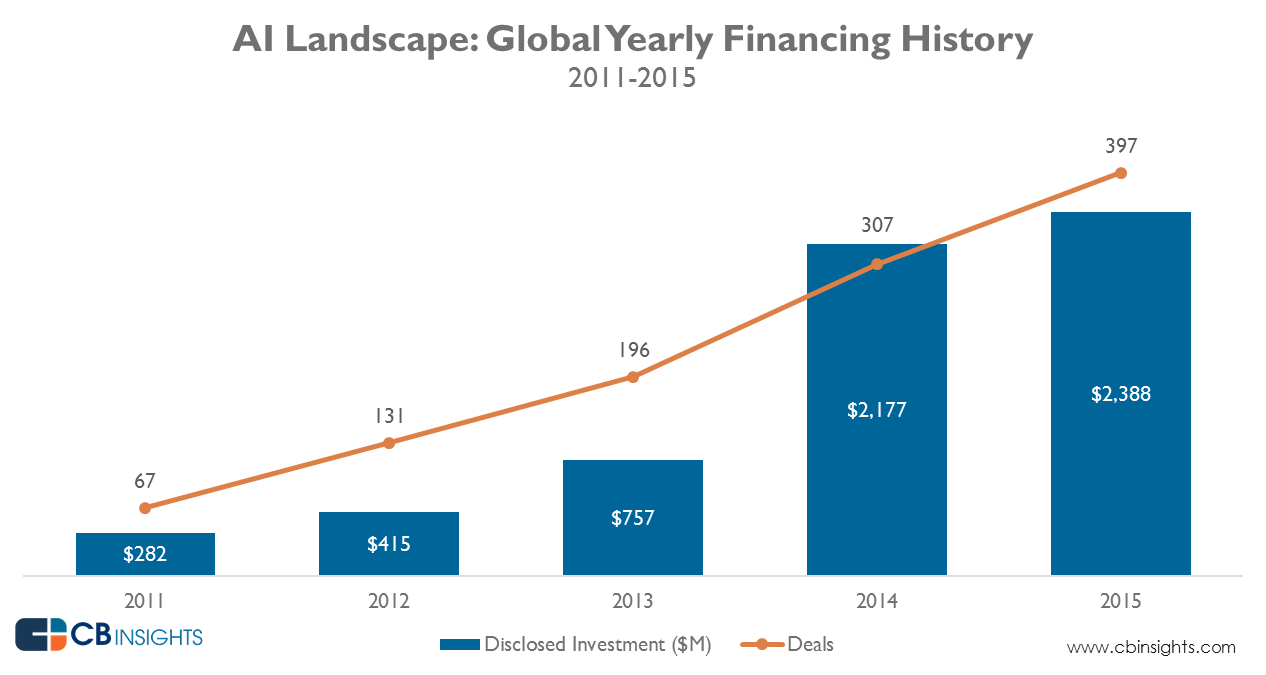Why Facebook Is Investing So Much in Artificial Intelligence

Investment in artificial intelligence startups is exploding. According to venture capital data company CB Insights, equity funding for AI companies reached a record high in the first quarter of 2016, and “over 200 AI-focused companies have raised nearly $1.5B” so far this year.
Artificial intelligence’s applications extend far beyond the design of human-like robots. Fans of HBO’s Silicon Valley might be familiar with Pied Piper’s “neural net,” the artificial intelligence layer that makes their compression algorithm smarter without any additional human brainpower. (Or, more importantly, human brain-hours.) In the real world, from which Silicon Valley borrows heavily, Facebook and other technology companies are looking to take advantage of AI in similar ways.
The potential use cases for AI in the social media space are far-reaching. Unsurprisingly, Facebook has emerged as one of the key players, leading the charge with both massive internal projects and select acquisitions of smaller companies. Here’s what they’re up to and why.
DeepText Is Going To Help Facebook Read And Understand Everything You Post
Every day, users share more 4.75 billion pieces of content on Facebook. Only through scalable artificial intelligence solutions could anyone hope to make sense of all that information. Facebook recently introduced “DeepText”, a deep-learning-based AI engine that understands textual content in 20 different languages.
Unlike humans, DeepText can comprehend thousands of posts per second; Facebook plans to enhance user experience on their platform through DeepText’s analysis. In Mark Zuckerberg’s own words: “We’re working on AI because we think more intelligent services will be much more useful… For example, if we had computers that could understand the meaning of the posts in News Feed and show you more things you’re interested in, that would be pretty amazing.”
DeepText will also improve transactions through automation, because the technology can detect user intent. Facebook provides an example: a user types “I need a ride” into Facebook Messenger. Thanks to DeepText, the platform will immediately understand that said user wants to find transportation, allowing Facebook to quickly offer choices to help answer the request.
Similarly, if someone posts that they’re selling an item for $100, DeepText allows Facebook to recognize the user intention to sell an item for a specified amount; as a result, Facebook can immediately provide the user with suggestions for making their sale efficiently. Down the line, Facebook could even match the seller with someone outside of their network who has expressed interested in purchasing a similar item.
Facebook Can Attract More Advertisers To Their Platform With Structured Data
Facebook, like its competitors, must continuously attract more advertisers to its platform—and it believes that investment in artificial intelligence will help with their bottom line. Collectively, the trillions of Facebook updates that go out every year are a huge pool of unstructured data. By using artificial intelligence to organize this data and make it usable, Facebook can open up new revenue channels. DeepText’s ability to identify user intent, in particular, will help advertisers target their ideal consumers more accurately.
Let’s quickly return to the example of a Facebook user selling a bike. As of right now, this bike seller could target their content to users interested in “biking.” However, there’s no way to know if the users targeted are in the market for new gear. DeepText’s ability to identify intent in a user’s status update creates an inbound marketing opportunity that puts Facebook toe-to-toe with Google, the current leader in intent-driven marketing and Facebook’s biggest rival in terms of digital ad sales.
AI Will Make Facebook’s Underlying Infrastructure Faster and Cheaper
Facebook’s core mission is to make the world more open and connected. But sustaining a network that serves 1.6 billion people trillions of pieces of content is expensive. Five years ago, Facebook introduced the Open Compute initiative, an open-source infrastructure project that has since saved them $2 billion in computing costs. More recently, Facebook launched FBLearner Flow, an artificial intelligence layer that will not only help host the content, but also assist as Facebook decides which posts should appear in your timeline—and in what order.
Besides creating the computing power to do this, there are real world barriers to a totally connected world—like language and different abilities—that pose challenges to simple, clear sharing between so many users. Artificial intelligence could help Facebook translate text posts, describe images for the visually impaired, and caption videos for the deaf, even on the massive scale at which Facebook operates.
“We’re trying to build more than 1.5 billion AI agents—one for every person who uses Facebook or any of its products,” Joaquin Candela, the head of Facebook’s Applied Machine Learning group, told Fortune. While that objective may strike some of us as unattainable, Facebook’s substantial resource investment into AI demonstrates how serious it is about achieving it.
Supporting Candela’s AML division is a 50-person team called the Facebook Artificial Intelligence Research group, which focuses on even deeper scientific trends in artificial intelligence. FAIR’s ideas are filtered through AML and eventually into FBLearned Flow the overall product.
Facebook Is Super Optimistic About Chat Bots For Messenger
In April 2016, Facebook opened up their wildly popular Messenger platform to developers. Over 10,000 developers are currently creating and submitting apps to the platform, with particular movement happening in the e-commerce, customer service, and media verticals. The users are already there: in 2015, messenger app use officially exceeded that of social media sites. Soon, making a hotel reservation, ordering a pair of sneakers, or getting a personalized news digest via Facebook Messenger will be the norm.
Developers design chat bots in a number of ways; some are simple to build but, consequently, less sophisticated in their interaction with users. These bots follow specific rules and respond to specific prompts, but they’ll get confused if a user asks about something they’re unfamiliar with. On the other end of the spectrum are bots powered by artificial intelligence platforms, like Chatfuel and Converse. These bots understand language beyond very specific commands, and they become smarter over time. They provide a much better experience for users, but are more complicated to design.
With its acquisition of Wit.ai, a natural language recognition tool for developers, Facebook now controls one of the world’s most dominant messaging platforms (Messenger), and technology that produces AI-powered bots for Facebook’s customers. It’s not unlike Netflix, which is both platform and content producer, and has substantial control within its brand-new industry.
Like with the iTunes store, chat bots must be submitted to Facebook for approval before going live. Currently, human testers vet all the bots, which creates a bottleneck in the release of new services for Messenger. In the near future, Facebook could use artificial intelligence to test thousands of new chat bots for malware and inappropriate content at a much quicker pace, opening up the Messenger platform to third-party developers dramatically.
Artificial Intelligence Is Popular Among Investors
As we mentioned, AI is one of the hottest markets in the tech industry among investors. In 2015, four companies raised $100M+ mega-rounds in industries like personal loans, sales and medical diagnostics (source: CB Insights). On the acquisition side, Google bought AI startup DeepMind for $400 million and Twitter intends to develop innovative artificial intelligence algorithms with Whetlab.
As for Facebook, they’re no slouch in the acquisition game. At the time of acquisition, Wit.ai had 6,000 developers and hundreds of apps created. The fact that Facebook kept the platform open and free suggests that they’re trying to attract even more developers interested in AI with their Build-Grow-Monetize strategy. In addition to Wit.ai, Facebook acquired Pebbles, a computer vision and augmented reality technology that can be used to improve AI and virtual reality.
Facebook’s Competitors Are Betting Heavily On Machine Learning Applications
IDC, a market research firm, estimates that the market for machine learning applications will reach $40 billion by 2020, and 60% of those applications are expected to be owned by Amazon, IBM, Google, and Microsoft. Those four companies are among Facebook’s most powerful competitors, so it’s only natural that the platform is keeping pace in terms of investment in AI.
Just a handful of examples:
- Amazon added machine learning capabilities to Amazon Web Services, a cloud software platform aimed at businesses, in 2015.
- IBM started earlier, revealing their AI Watson unit in 2014. Since then, 80,000 developers have downloaded and started using the software.
- In November 2015, Google released to engineers their machine learning technology called TensorFlow, as open source software. The company has also created a text-to-speech transcription program and vision software that can identify images.
- Microsoft already has 18 machine learning services and the company plans on revealing more AI projects soon. Their current machine learning services include facial recognition, product recommendations, and text analysis.
The competition in the machine learning industry is fierce, and the winners will profit richly.



